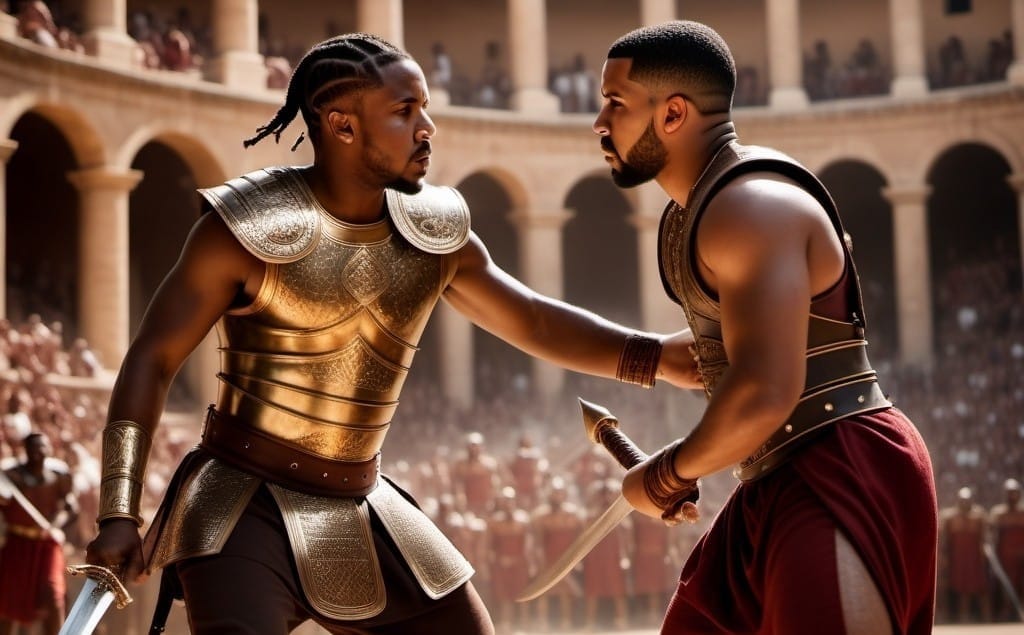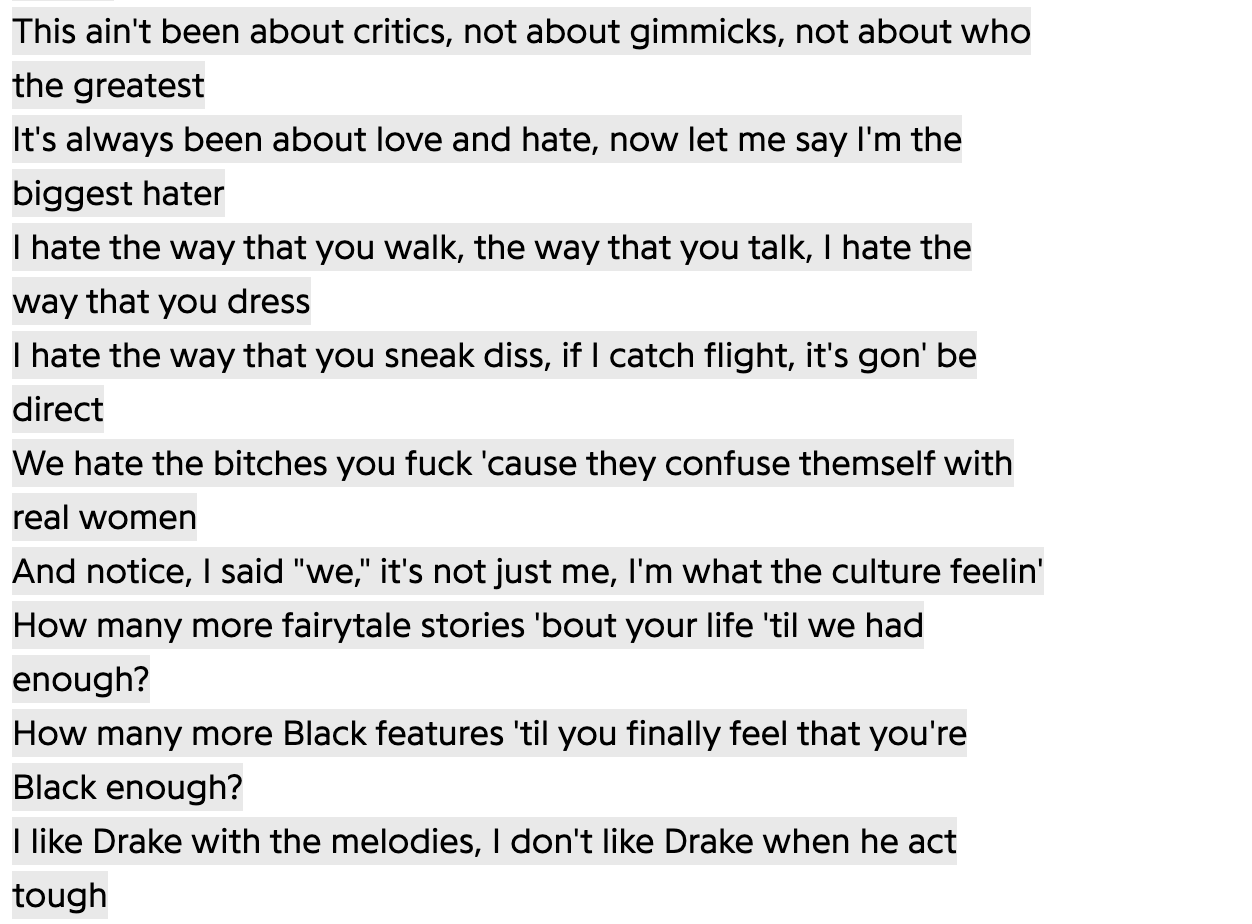Kendrick Lamar vs. Drake: Gladiators are Fighting, But We're Not Winning
It’s hard for me to get down with this iteration of hip-hop’s coliseum. The gladiators aren’t fighting for anything I can believe in.

Last summer, my lady and I went to Yankee Stadium to join thousands of others in the hip-hop 50th anniversary celebration. It was one of several events around New York that brought dozens of artists into the spotlight to perform what are now nostalgic classics, reminding us of what were the easier days of our youth.
Lots of the artists themselves had been competitors, even enemies, and in some cases, the animosity still lingered. But the reality is that their competition made them better at what they did and hip-hop as a culture flourished because of their artistry.
Suddenly 2024 brings us a new beef that should pique my interest: Kendrick Lamar and Drake, a Godzilla vs. King Kong matchup. But man, I just can’t grasp it. A lot of it stems from the fact that the fans are participating in this battle on social media, a landscape for performatives, phonies, and clout chasers. Some of the dumbest shit I’ve ever seen in my life was on Twitter, Instagram, TikTok and Facebook.
What’s being posted on these platforms are things about nationality, who’s Black enough, who sexed who, and other nonsense. So when a hip-hop battle is fought in the coliseum, I need the gladiators to fight for purpose.
I’m old enough to remember the rap beefs of the 80s between people like Roxanne Shante and UTFO, Kool Moe Dee and LL Cool J, and the most famous of the time, KRS-ONE’s Boogie Down Productions and MC Shan and the Juice Crew. The interesting thing about them was their competitions, which could at times be truly vicious, often pit Black people from one part of New York City against the other.
But the redeeming thing is that this was all very good for rap music and hip-hop as a culture. These cats didn’t just sell records (which they never made that much money from anyway), but they created a new way of life and a way of self-expression for their peers living in any given American city. Before long, as with every other form of Black music, white America, then the world, jumped on the bandwagon and took all the profits.
After that, it was clear that hip-hop needed beef to keep the genre fresh and the music creative. Ensuing conflicts, that largely stayed on records with some notable exceptions (more on that later), ranged from NWA versus Ice Cube to the LOX versus Beanie Siegel, and so many in between.
The Long and Short (shrift)
So now we get to the issue between Kendrick Lamar, who I’ve always considered a fine, artistic lyricist, and Drake, who I could never take that seriously outside of his brand being just party music (no shade to his fans). But there's no question about the incredible impact they have had on rap music. Still, let the current zeitgeist tell it, this clash is the biggest conflict between two individuals since Cane and Abel.
At one time they collaborated on Drake’s “Buried Alive Interlude” off his 2011 Take Care album. But fast forward to 2023 when Drake joined J. Cole on “First Person Shooter” in which Cole said they were rap’s “big three.” This didn’t sit well with Kendrick. When he teamed up with Metro Boomin and Future on “Like That” two months ago, he pushed back saying “motherf*ck the big three, n*gga, it’s just big me.”
Long story short, that led to a diss track from Cole aimed at Kendrick called “7-Minute Drill,” for which he apologized publicly days later. Some criticized him for it, but I’ve always liked Cole and felt he was simply saying, “I ain’t that guy.” Good enough. But Drake kept it going with “Pushups,” where he insults Kendrick’s height and shoe size.
Well, that tore it, bruv. Each launched a barrage of recorded disses fired away like missiles on a nighttime heat vision camera. But the most noticed so far are the brutal tracks from Kendrick, “Not Like Us,” “Meet the Grahams,” and the most bombastic “Euphoria.”
Here are some bars:

The latest in this saga has been the release of Kendrick’s “Not Like Us,” which has set records for a hip-hop streaming release, and Drake’s response, “The Heart, Part 6,” in which he defends himself, perhaps a departure from his other diss tracks, “Taylor Made Freestyle,” and “Family Matters.” It’s dizzying the speed at which these shots are being fired. I’ve waited more than 10 years for a new Sade album, but these cats turn out tracks faster than Tyson’s processes chicken.
Trying to Escape a Straitjacket
I should be impressed with all of this. I’ve spent the last few years complaining about how hip-hop has become so saccharine and uncreative. Hypersexuality, superficiality, and death culture seemed to be all that sold and got streamed. Few artists were inspiring to me, and I know I’m not the only one who felt this way. I was left yearning for the days of old, a place and time where I felt safe and validated, but was ironically more violent.
In the summer of 1996, I saw the Notorious B.I.G. the last time he appeared on stage in Detroit. At the time Biggie Smalls, as he called himself, was in the middle of a feud with his one-time homie Tupac Shakur. We know the story by now. They turned into enemies after Shakur was shot and seriously wounded two years prior as he left a New York recording studio.
After that, the East Coast/West Coast beef was on. People invested themselves into a war of scurrilous insults, threats, and scandals that their record labels, Death Row and Bad Boy Records, profited from immensely. That war, also, fueled a generation of fandom.
But we also know how that war ended. Tupac dead, Sept. 13, 1996. Biggie dead, March 9, 1997. Rap fans were asking themselves, did we do this? In our lust for competitive rappers, did we drive these young men, one a father, to the point where insults between the two, mushroomed into the same between overzealous record industry partisans, and resulted in their deaths? It was at that point we realized something terrible: there was no purpose in this beef. Two human beings were dead because of pettiness on steroids.
The demise of Biggie and Tupac is still seen as a turning point in the culture we grew up with, which took us from the post-Civil Rights years into the turn of the century. Books, lectures, films, and even courses have been taught about what happened to them. But it still all comes down to what sparked it: Competition … and that’s nothing new in hip-hop or music itself.
When I was a kid, the rap beefs were preceded by the one between Prince and Rick James. One would come out with an amazing album, then so would the other, then they’d repeat. James debuted the Mary Jane Girls. Prince responded with Vanity 6. James brings out Teena Marie. Prince responds with Sheila E. Before long, you had a library of unbelievable music. Throw in Michael Jackson, Stevie Wonder, and a few others into the mix and you can easily argue that the period between 1977 and 1984 was the best in music history.
I’ll argue that competitive spirit influenced those early rap beefs. It was okay for them to practice one-upmanship because they knew the fans loved it. But since these were not professional musicians, they put it all in their lyrics, and the lyrics were about what they represented, their worlds and their lives. It was never about just the single MC.
And that’s the difference between the classic Boogie Down and Juice Crew beef and the Kendrick/Drake clash. It was not about individuals, it was about the world they lived in and how they saw it. Now what I’m seeing is a who-can-go-lower-below-the-belt-tit-for-tat at a time of very real global conflicts, genocides, famines, wars, economic uncertainty, climate change, and another stupid election season that affects my life and everyone else’s.
Did these issues exist in the 80s, yes, but in 2024, I have a reason to take all the other things very seriously. When I was 15, I didn’t. So as a more mature person, it becomes hard for me to put much weight into grown men north of 35 who are putting their energies into talking about themselves rather than what they represent as men.
All this means you probably won’t catch me participating in this chapter of the rap wars now. My day for that is over. Blasting my favorites on my radio, arguing with my friends over whose lyrics are the freshest, or what DJ made the dopest beats. And I’m fine with that. I’ll stick with the classics and my memories.
But I feel bad for that 15-year-old of today who I’d love to see carry hip-hop into the future. Because this is what he’s given to work with. The only thing I ask the culture to do is just please, please give this kid something to believe in.
[Editor’s Note: Rakim is the GOAT. That is religion to me. I will not be convinced otherwise, and it is not up for discussion, so I left him out of this.]
[Second Editor's Note: An earlier version of this post mistakenly said Kendrick Lamar appeared with J. Cole and Drake on First Person Shooter.]